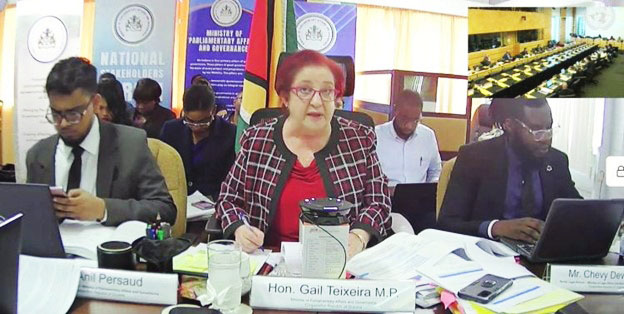Following intense questioning and rebukes over three days, the Guyana Government has submitted additional information to the United Nations Human Rights Committee (CCPR) and has objected to some of the allegations that were put to it.
In a statement yesterday, the government said that on Friday, 22 March 2024, it submitted written responses to the United Nations Human Rights Committee, as part of the ongoing review of Guyana’s Third Periodic Report by the United Nations Human Rights Committee which took place from 18th to 20th March 2024. As this periodic process continues, the statement said that the submission intends to provide updates and additional information in response to the questions raised by the Human Rights Committee in relation to the implementation of the International Covenant on Civil and Political Rights (ICCPR).
In this further submission, the statement said that Guyana placed on record, the facts surrounding several issues that were raised in “an inaccurate and misinformed manner” during the review, particularly in relation to the corruption allegations against the Judiciary, the Environmental Protection Agency, and the sitting Vice President of Guyana, Bharrat Jagdeo.
“The Government objects to these allegations and has urged the Human Rights Committee to carry out due diligence to verify the information it receives before making unfounded allegations”, the statement said.
The government statement said that by virtue Article 154A of the constitution of Guyana, the ICCPR is afforded constitutional supremacy.
“To that end, all the constitutional commissions which also function as safeguards in Guyana’s human rights architecture are all in place, are functional and receive their annual subventions from the Government. Every citizen in Guyana, without discrimination, has access to a fair and independent justice system on all matters. The Government therefore encourages formal complaints on corruption allegations be made to the relevant domestic commissions and redress mechanisms available for an appropriate investigation to be carried out”, the statement said.
It said that Guyana places paramount importance on consultation and inclusivity in decision making at all levels. The statement added that the constitutional reform expected to commence in 2024 will take a consultative approach, and every Guyanese will determine relevant constitutional amendments.
“Contrary to the contentions made by the Committee as it relates to the Gas to Energy project, members of the public were engaged through notifications, opportunities to make submissions, opportunities to attend scoping meetings, consultations, disclosure meetings, and so forth. Furthermore, there is no proof to show any bias in favour of multinational corporations in the environmental decision- making process in Guyana”, the statement said.
The government in the statement also rejected the allegations in relation to media and press freedom. “Contrary to the allegations, the government respects and promotes Freedom of Expression. In this regard, the Committee is reminded to fact check allegations on the ownership of the local media in Guyana, particularly since more than a dozen social commentators and government critics operate daily talk shows across multiple broadcast social media platforms, with no interference from the government. In fact, the relevant authorities take harassment, threats, and attacks seriously and investigate and prosecute any reports received”, the statement declared.
The Government of Guyana said it hopes that the additional information will be considered by the Human Rights Committee “in its interpretation of the progress which Guyana continues to make as a State party, towards the full realization of the fundamental principles of the ICCPR and the rights contained therein”.
A number of other issues were raised by the committee including the non-confirmation of a Chancellor of the Judiciary and a Chief Justice and extrajudicial killings.
The committee is to issue concluding observations.






